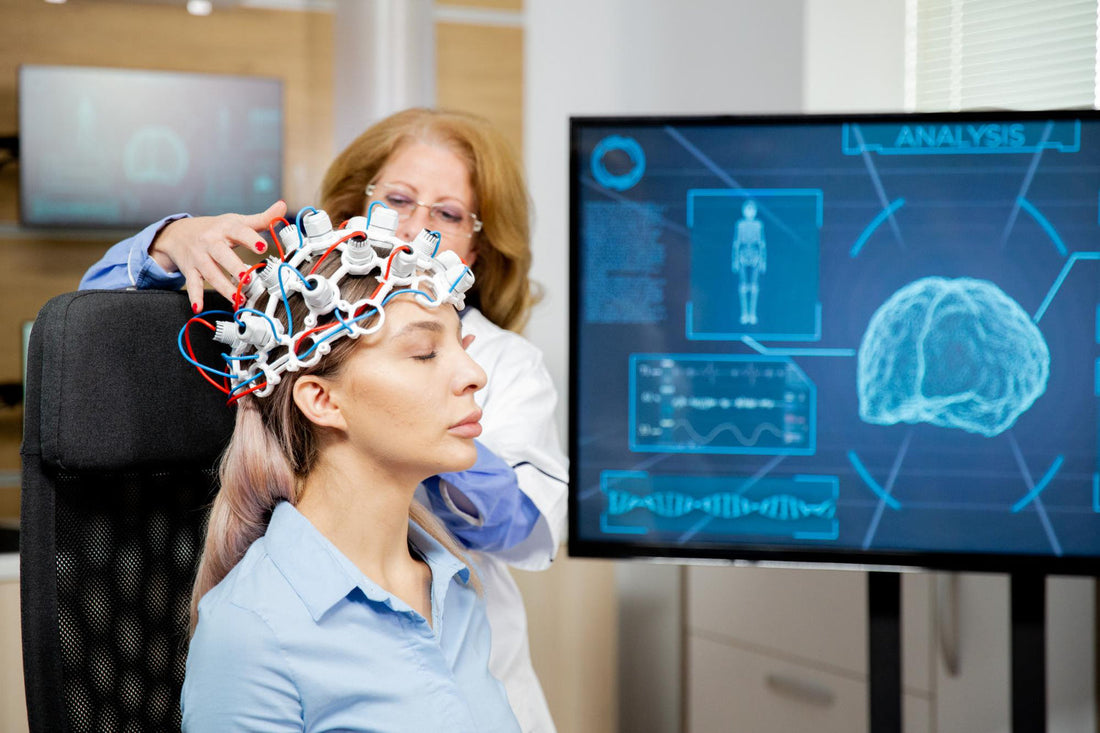
Enhancing Brain Function: The Role of NREM Sleep
Share
How Deep Sleep Unlocks Your Brain's Hidden Potential
If you’ve ever pulled an all-nighter and found yourself foggy, forgetful, and mentally sluggish the next day, you’ve experienced firsthand what scientists have long known: sleep is essential for brain function. But now, a groundbreaking study published in Science reveals exactly how non-REM (NREM) sleep enhances brain activity—specifically through synchronization and improved information encoding.
This discovery doesn’t just confirm what sleep scientists suspected—it provides a detailed explanation of the precise mechanisms that allow the brain to process, organize, and store information during the night. Understanding this could reshape everything from how we approach education and productivity to how we treat neurological conditions.
What Is NREM Sleep?
Sleep is divided into two broad categories:
-
Non-Rapid Eye Movement (NREM)
-
Rapid Eye Movement (REM)
NREM sleep is composed of three stages:
-
Stage 1: Light sleep
-
Stage 2: Onset of real sleep; heart rate slows
-
Stage 3: Deep sleep (also called slow-wave sleep)
This study focused on Stage 3 NREM, the deep sleep phase during which the brain produces high-amplitude, low-frequency delta waves. This is the most restorative stage of sleep, when tissue growth and repair occur, the immune system strengthens, and—as we now understand more clearly—the brain consolidates memories and optimizes cognitive performance.
The Study: What Was Discovered
Researchers used high-resolution brain imaging and electrophysiological monitoring on human and animal subjects to observe how the brain behaves during NREM sleep. They found that during deep NREM sleep, neurons across various brain regions begin to fire in synchrony—essentially “syncing up” like a well-rehearsed orchestra.
This synchronization allows the brain to:
-
Reorganize neural pathways
-
Reinforce learned information
-
Discard irrelevant data
The result? A brain that is sharper, more focused, and better prepared to learn and solve problems the next day.
"We saw massive network-wide coherence in the brain that allows previously scattered data to be integrated," explained Dr. Alicia Romero, neuroscientist and co-author of the study. "This is the foundation of higher-order cognition."
Brain Synchronization: Why It Matters
At its core, cognition relies on how well different parts of the brain communicate with each other. Synchronization is a measure of how in-sync these neural activities are across regions like the prefrontal cortex, hippocampus, and thalamus.
During NREM sleep:
-
The hippocampus replays new memories for consolidation.
-
The neocortex integrates these memories into long-term storage.
-
The thalamus regulates sensory input, allowing uninterrupted processing.
This integrated loop—sometimes referred to as the hippocampal-thalamo-cortical triad—is only fully active during deep NREM sleep.
The Role of Sleep in Learning
We often hear that sleep is important for students, but this study offers evidence that deep sleep is the engine behind learning:
-
Students who get more NREM sleep show higher recall scores.
-
Problem-solving ability increases after deep sleep.
-
Even naps that include NREM phases boost retention by 20–30%.
In fact, the researchers noted that trying to learn complex material while sleep-deprived is like pouring water into a leaky cup: your brain simply can’t retain it.
Why Quality Matters More Than Quantity
It’s not just about sleeping longer—it’s about getting the right kind of sleep.
You could be in bed for eight hours, but if your sleep is fragmented (due to blue light, stress, alcohol, or poor sleep hygiene), you may not spend enough time in the deep NREM phase.
Strategies to increase deep sleep:
-
Go to bed and wake up at consistent times.
-
Limit screen exposure 90 minutes before sleep.
-
Use a cool, dark room (65–68°F is ideal).
-
Consider magnesium or glycine supplementation.
-
Avoid caffeine after 2 p.m.
Clinical Applications: Beyond Just Sleep
The study’s implications go far beyond feeling rested:
1. Alzheimer’s and Dementia
Deep sleep is when the brain clears out beta-amyloid, a waste protein linked to Alzheimer’s disease. Enhancing NREM sleep could be a therapeutic avenue to slow cognitive decline.
2. ADHD and Learning Disabilities
Many children with ADHD also suffer from sleep disorders. Encouraging NREM sleep could improve attention, memory, and academic performance.
3. Traumatic Brain Injury (TBI)
After brain trauma, deep sleep supports recovery by reorganizing neural networks and reducing inflammation.
4. Depression and Anxiety
Sleep disruption is a hallmark of mood disorders. Targeting deep sleep could be a high-leverage way to improve emotional regulation and resilience.
Brain Waves and Memory Encoding
A crucial part of the study involved analyzing EEG (electroencephalogram) data. The researchers found that sleep spindles (short bursts of brain activity in Stage 2) transition into delta waves (Stage 3) in a way that enhances memory encoding.
This is when your brain makes decisions about:
-
What to keep
-
What to delete
-
What to strengthen
These processes occur offline, meaning your conscious brain is inactive, but your subconscious brain is working overtime.
The Tech Factor: Sleep Trackers Aren’t Enough
Most consumer-grade sleep trackers measure movement and heart rate, but they often fail to accurately detect sleep stages. If you’re serious about optimizing your NREM sleep:
-
Use a sleep lab for professional analysis (polysomnography)
-
Or use EEG-capable headbands like Muse S or Dreem2 (more accurate but pricier)
Real-Life Case Study: Michael, 38
Michael, a software engineer, was burning out. He was sleeping 7 hours a night but felt constantly foggy. After undergoing a sleep study, it was revealed that his deep NREM sleep accounted for only 5% of his night—far below the average 13–23%.
Through lifestyle changes—cutting alcohol, using a white noise machine, and sticking to a consistent bedtime—he increased his deep sleep to 18% and reported dramatically improved focus, memory, and mood.
“It’s like going from dial-up to fiber-optic. My brain actually works again,” he says.
The Business and Productivity Case
Companies that prioritize employee sleep hygiene (e.g., Google, Nike, Procter & Gamble) often report:
-
Higher creativity
-
Faster decision-making
-
Lower absenteeism
Some are even offering "sleep pods" or subsidizing sleep coaching as part of their wellness benefits. As the link between NREM sleep and brain performance becomes clearer, expect this to become more common.
The Next Frontier: Sleep Engineering
In light of this research, new startups are working on technologies to enhance NREM sleep:
-
Acoustic stimulation to boost delta waves
-
Temperature-controlled beds to maintain optimal body heat
-
Supplements targeting slow-wave sleep like L-theanine, glycine, and GABA
Eventually, we may see personalized sleep regimens designed to maximize deep sleep based on genetics, lifestyle, and cognitive goals.
Final Thought
This study offers one of the clearest insights yet into how NREM sleep acts as a neural upgrade session—organizing chaos into clarity, emotion into reason, and information into knowledge.
It’s not just about rest. It’s about repair. It’s about optimization. It’s about showing up to life with a fully functioning, high-performance brain.
If you care about your mind, prioritize your sleep. If you want to level up your cognition, target your NREM.
The brain doesn’t grow during the day. It grows at night. Use that knowledge—and go to bed.
